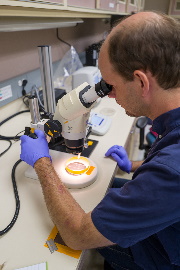| William B. Walker III |

|

Education:
BS, Michigan State University, Zoology and Genetics, 2001
Ph.D., Vanderbilt University, Neuroscience, 2008
Research Interests:
The molecular biology, genetics, and genomics of insect pests of temperate tree fruit. Primary focus is on the codling moth, Cydia pomonella and Colladonus leafhoppers that transmit the X-disease pathogen to cherry and other stone fruits. Topics include chemosensory and immune systems, insect vector and plant pathogen interactions, and biological control with entomopathogenic viruses.
Aims:
To improve our knowledge of the molecular genetics and genomics of tree fruit insect pests as it relates to their biology (physiology, biochemistry and behaviors) and ecological interactions. To develop genetic resources, including sequenced genomes and transcriptomes, for insect pests where none previously existed. To apply these resources and knowledge towards the development of novel and sustainable genetics- or biomolecular-based/informed pest management strategies.
Background:
Tree fruit, including apple, cherry and pear are major orchard crop products in Central Washington and the Pacific North West. Pest insects of these fruit are a major economic concern. In the orchard environment, some insects cause direct damage by eating the fruit, while other insects spread microbial pathogens that cause disease in the fruits or their trees. During the past several decades, research on tree fruit pest insects has contributed to the development and implementation of sustainable management practices, but the problem persists. Further research is required to sustainably manage long established pests as well as recently invasive species.
Approach:
A genomics/transcriptomics approach in utilized to understand broadly the genetic makeup of target insects. Functional studies are carried out on specific candidate genes to understand their role in the physiology, behavior and ecological interactions of the insect. CRISPR gene editing is one molecular laboratory tool that is utilized specifically in codling moth that allows direct genetic studies. Knowledge gained from this approach is then used in the field, aimed at influencing or disrupting target genes to ultimately affect the physiology or behavior of the insect and control damage of the fruit orchard products.
Laboratory Personnel:
Jennifer Stout, Biological Science Technician (Molecular Genetics)
Dan Hallauer, Biological Science Technician (codling moth virus)
Janine Jewett, Biological Science Technician (codling moth diet kitchen)
Katherine Easterling, Post Doc Associate

